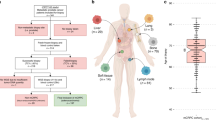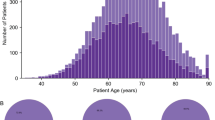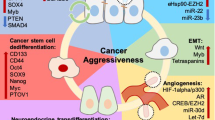Abstract
Primary prostatic adenocarcinoma (pPC) undergoes genomic evolution secondary to therapy-related selection pressures as it transitions to metastatic noncastrate (mNC-PC) and castrate resistant (mCR-PC) disease. Next generation sequencing results were evaluated for pPC (n = 97), locally advanced disease (involving urinary bladder/rectum, n = 12), mNC-PC (n = 21), and mCR-PC (n = 54). We identified enrichment of TP53 alterations in high-grade pPC, TP53/RB1 alterations in HGNE disease, and AR alterations in metastatic and castrate resistant disease. Actionable alterations (MSI-H phenotype and HRR genes) were identified in approximately a fifth of all cases. These results help elucidate the landscape of genomic alterations across the clinical spectrum of prostate cancer.
This is a preview of subscription content, access via your institution
Access options
Subscribe to this journal
Receive 4 print issues and online access
$259.00 per year
only $64.75 per issue
Buy this article
- Purchase on Springer Link
- Instant access to full article PDF
Prices may be subject to local taxes which are calculated during checkout
Similar content being viewed by others
References
Jernberg E, Bergh A, Wikstrom P. Clinical relevance of androgen receptor alterations in prostate cancer. Endocr Connect 2017. 2017;6:R146–R161.
Formaggio N, Rubin MA, Theurillat JP. Loss and revival of androgen receptor signaling in advanced prostate cancer. Oncogene. 2021;40:1205–16.
Abida W, Armenia J, Gopalan A, Brennan R, Walsh M, Barron D, et al. Prospective genomic profiling of prostate cancer across disease states reveals germline and somatic alterations that may affect clinical decision making. JCO Precis Oncol. 2017;2017:PO.17.00029.
Gupta S, Sholl LM, Yang Y, Osunkoya AO, Gordetsky JB, Cornejo KM et al. Genomic analysis of spermatocytic tumors demonstrates recurrent molecular alterations in cases with malignant clinical behavior. J Pathol. 2024;262:50–60.
Akhoundova D, Feng FY, Pritchard CC, Rubin MA. Molecular genetics of prostate cancer and role of genomic testing. Surg Pathol Clin. 2022;15:617–28.
Aggarwal R, Huang J, Alumkal JJ, Zhang L, Feng FY, Thomas GV, et al. Clinical and genomic characterization of treatment-emergent small-cell neuroendocrine prostate cancer: a multi-institutional prospective study. J Clin Oncol. 2018;36:2492–503.
Abida W, Cheng ML, Armenia J, Middha S, Autio KA, Vargas HA, et al. Analysis of the prevalence of microsatellite instability in prostate cancer and response to immune checkpoint blockade. JAMA Oncol. 2019;5:471–8.
Antonarakis ES, Isaacsson Velho P, Fu W, Wang H, Agarwal N, Sacristan Santos V, et al. CDK12-altered prostate cancer: clinical features and therapeutic outcomes to standard systemic therapies, poly (ADP-Ribose) polymerase inhibitors, and PD-1 inhibitors. JCO Precis Oncol. 2020;4:370–81.
Cancer Genome Atlas Research N. The molecular taxonomy of primary prostate cancer. Cell. 2015;163:1011–25.
Bolton KL, Ptashkin RN, Gao T, Braunstein L, Devlin SM, Kelly D, et al. Cancer therapy shapes the fitness landscape of clonal hematopoiesis. Nat Genet. 2020;52:1219–26.
Author information
Authors and Affiliations
Contributions
Provision of study materials/patients/data collection: S.D., M.R.M., A.S., B.R.K., and S.G. Data analysis: S.D., M.R.M., A.S., J.C.C., B.R.K., and S.G. Supervision: S.G. Manuscript writing: S.D., M.R.M., A.A.W., B.A.P., A.S., B.T., R.D.W., A.R., L.H.H., R.E.J., B.J.S., R.H.T., B.C.L., S.A.B., R.J.K., D.S.C., J.F.Q., E.D.K., L.C.P., B.A.C., K.C.H., J.C.C., B.R.K., and S.G. All authors reviewed the paper and agreed to the final version of the manuscript.
Corresponding author
Ethics declarations
Competing interests
The authors declare no competing interests.
Additional information
Publisher’s note Springer Nature remains neutral with regard to jurisdictional claims in published maps and institutional affiliations.
Supplementary information
Rights and permissions
Springer Nature or its licensor (e.g. a society or other partner) holds exclusive rights to this article under a publishing agreement with the author(s) or other rightsholder(s); author self-archiving of the accepted manuscript version of this article is solely governed by the terms of such publishing agreement and applicable law.
About this article
Cite this article
Dasari, S., McCarthy, M.R., Wojcik, A.A. et al. Genomic attributes of prostate cancer across primary and metastatic noncastrate and castrate resistant disease states: a next generation sequencing study of 183 patients. Prostate Cancer Prostatic Dis (2024). https://doi.org/10.1038/s41391-024-00814-2
Received:
Revised:
Accepted:
Published:
DOI: https://doi.org/10.1038/s41391-024-00814-2



